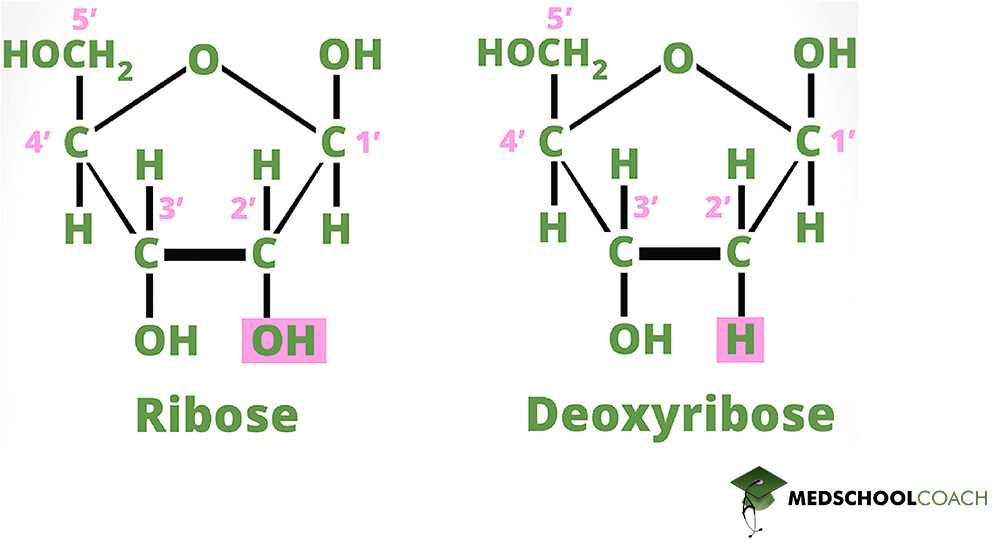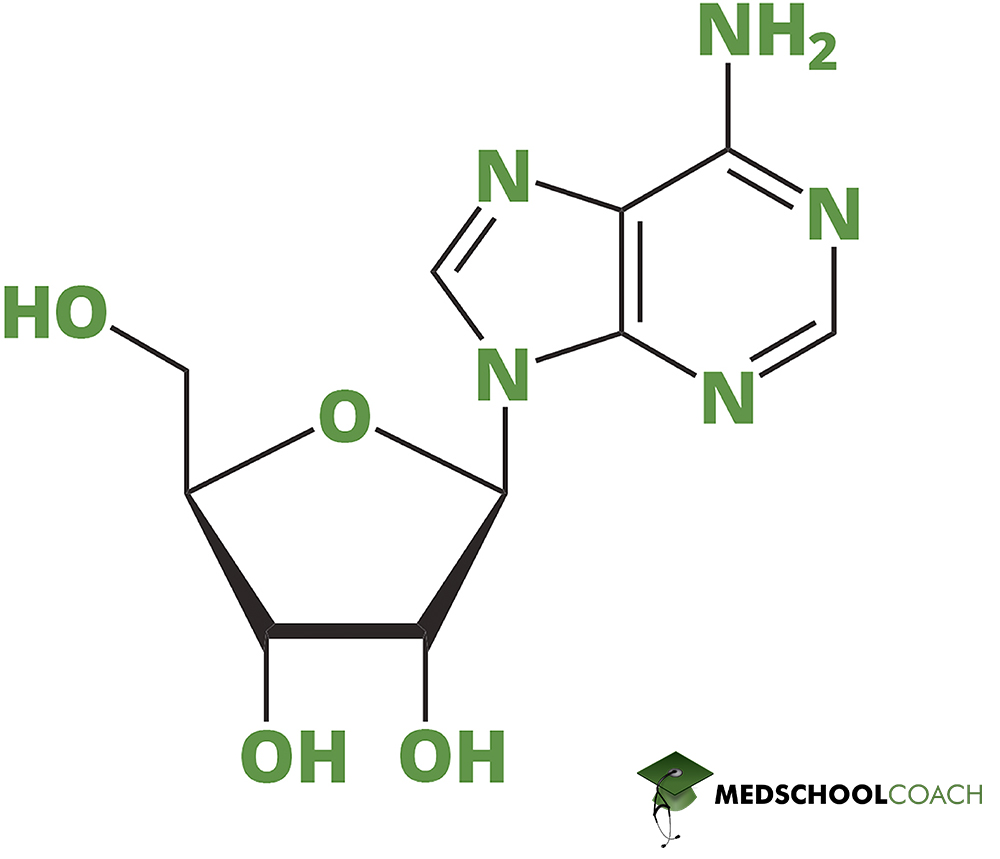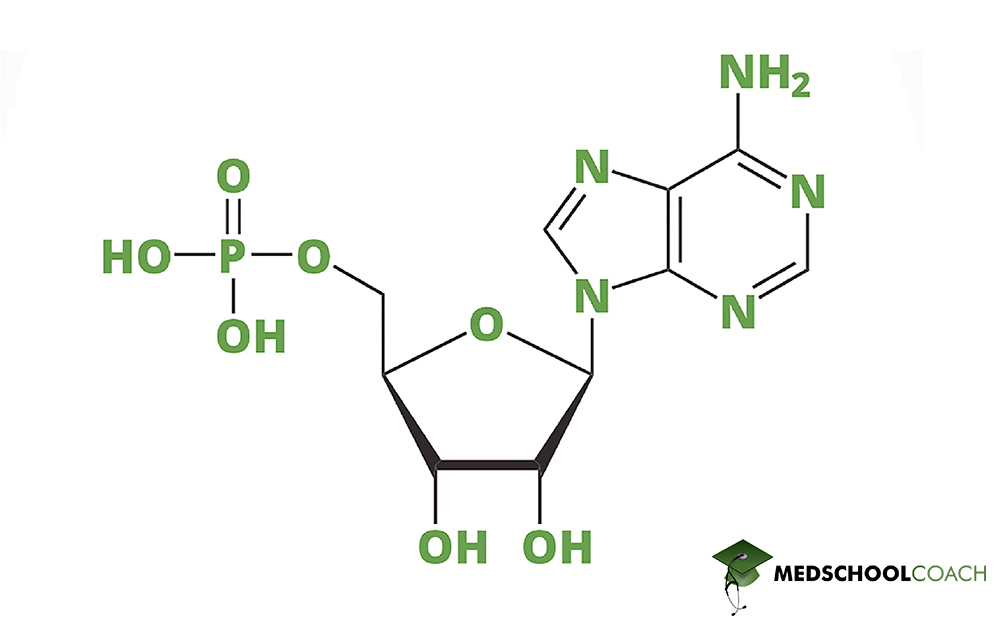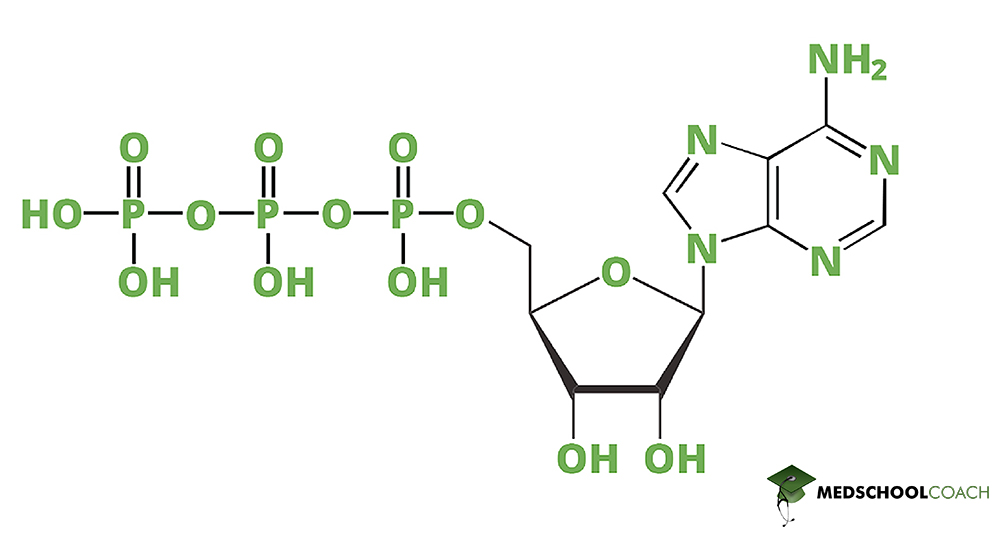Nucleotides
MCAT Biochemistry - Chapter 4 - Section 1.1 - Nucleotides and Nucleic Acids - Nucleotides
- Home
- »
- MCAT Masterclass
- »
- Biological and Biochemical Foundations of Living Systems
- »
- Biochemistry
- »
- Nucleotides – MCAT Biochemistry
Sample MCAT Question - Nucleotides
a) Nucleotides consist only of a five-carbon sugar and a phosphate group
b) Nucleosides are an essential source of energy for metabolic processes
c) Nucleotides are the building blocks of RNA and DNA
d) Nucleosides are made up of nucleotides plus a phosphate group
C is correct. Nucleotides are the building blocks of RNA and DNA.
RNA is composed of nucleotides containing a ribose sugar, while DNA is made from those containing a deoxyribose sugar. Choice A is incorrect because nucleotides are made from a five-carbon sugar (ribose or deoxyribose), a phosphate group, and a nitrogenous base. Choice B is incorrect because it is nucleotides, not nucleosides, that constitute a source of energy for metabolic processes. Choice D is incorrect because it reverse the relationship between nucleosides and nucleotides. Nucelotides are made from nucleosides plus one or more phosphate groups, not the other way around.
Get 1-on-1 MCAT Tutoring From a Specialist
With MCAT tutoring from MedSchoolCoach, we are committed to help you prepare, excel, and optimize your ideal score on the MCAT exam.
For each student we work with, we learn about their learning style, content knowledge, and goals. We match them with the most suitable tutor and conduct online sessions that make them feel as if they are in the classroom. Each session is recorded, plus with access to whiteboard notes. We focus on high-yield topics if you’re pressed for time. If you have more time or high-score goals, we meticulously cover the entire MCAT syllabus.
Nucleotide Structure and Function
Nucleotides are small biomolecules that are essential for all life. Three distinct components make up nucleotides: a 5-carbon sugar (ribose or deoxyribose), a nitrogenous base, and a phosphate group. This post discusses nucleotide structure, the difference between nucleotides vs nucleosides, and the role nucleotides play in living cells.
Sugars in Nucleotides (Ribose or Deoxyribose)
The 5-carbon sugar that makes up a nucleotide may be either a ribose or a deoxyribose. The difference between these two sugars is in the presence or absence of an oxygen atom at the 2’ carbon position. As you can see from Figure 1, a ribose sugar has a hydroxyl group at both the 2’ and 3’ carbon positions, while the deoxyribose has a hydroxyl group at the 3′ carbon only (hence the name “deoxyribose”).

Nitrogenous Bases in Nucleotides
There are two types of nitrogenous bases found in nucleotides: purines and pyrimidines. Purines have two fused rings and include adenine and guanine (Figure 2). Pyrimidines, on the other hand, have one ring and include cytosine, thymine, and uracil (Figure 3).


Nucleotides vs Nucleosides
The combination of a 5′-carbon sugar (either ribose or deoxyribose) and a nitrogenous base (either a purine or a pyridine) is known as a nucleoside. Though the terms nucleoside and nucleotide sound similar, they are, in fact, distinct from one another. As mentioned earlier, a nucleotide consists of a 5-carbon sugar, a nitrogenous base, and a phosphate group, while a nucleoside, as we just mentioned, consists only the latter two components: a 5-carbon sugar and a nitrogenous base. In a sense, then, a nucleotide is a phosphorylated nucleoside, and a nucleoside is a dephosphorylated nucleotide.
To get a better sense of this distinction, look at Figures 4 and 5 below. Figure 4 shows a nucleoside called adenosine, which is made from ribose (a 5-carbon sugar) and adenine (a nitrogenous base). Figure 5, on the other hand, shows a nucleotide made from adenosine called adenosine monophosphate or AMP. As you can see, AMP has the same nucleoside structure as adenosine with the addition of a phosphate group.


It’s worth noting that nucleotides may have more than one phosphate a group. A famous example, and one related to AMP, is adenosine triphosphate, or ATP, which is the universal energy carrier found in all life on Earth. As you can see from Figure 6, ATP is identical to AMP, except that it has three phosphate groups rather than one.

Nucleotide Biochemical Function
Nucleotides play several crucial roles in living cells:
– They are the building blocks of nucleic acids like DNA and RNA. Nucleotides made from deoxyribose combine to form DNA, while those made from ribose form RNA. As discussed in another post, DNA has an antiparallel, double-helical structure.
– They serve as energy storage molecules. The most famous example, of course, is ATP, but other nucleotides like guanosine triphosphate (GTP) and uridine triphosphate (UTP) also play important roles in energy storage and transfer.
– They play a crucial role in cell signaling pathways. For instance, the nucleotide cyclic AMP (cAMP) mediates the intracellular effect of hormone binding at cell surface receptors.
Explore More MCAT Masterclass Chapters
Take a closer look at our entire MCAT Masterclass or explore our Biochemistry lessons below.

One-on-One Tutoring
Are you ready to take your MCAT performance to a whole new level? Work with our 99th-percentile MCAT tutors to boost your score by 12 points or more!
See if MCAT Tutoring can help me
Talk to our enrollment team about MCAT Tutoring

MCAT Go Audio Course
Engaging audio learning to take your MCAT learning on the go, any time, any where. You'll be on the way to a higher MCAT score no matter where you are. Listen to over 200+ lessons.

MCAT Practice Exams
Practice makes perfect! Our mock exams coupled with thorough explanations and in-depth analytics help students understand exactly where they stand.

MCAT Prep App
Access hundreds of MCAT videos to help you study and raise your exam score. Augment your learning with expert-created flashcards and a question banks.
